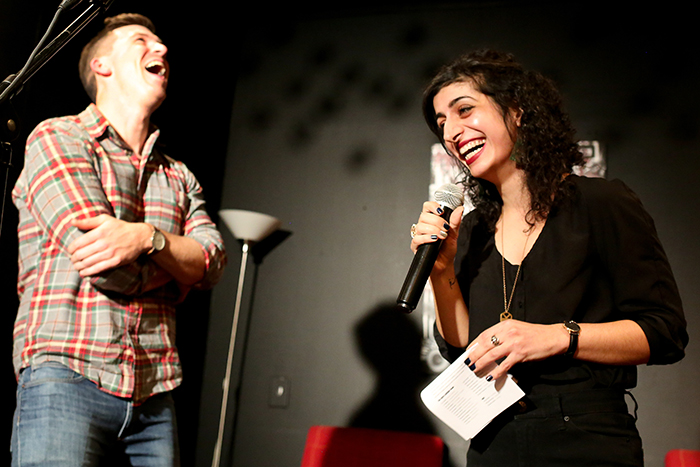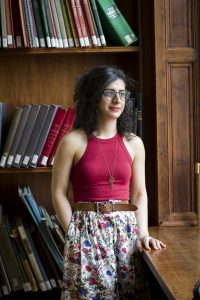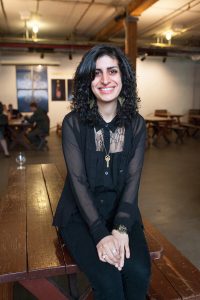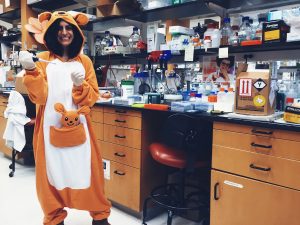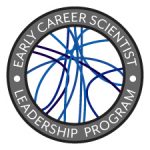 AAAS Science, Technology and Policy fellow Maryam Zaringhalam started community engagement activities during her PhD that helped her transition into a career in science policy and communication. She is currently a leadership member of 500 Women Scientists and a DC producer for The Story Collider.
AAAS Science, Technology and Policy fellow Maryam Zaringhalam started community engagement activities during her PhD that helped her transition into a career in science policy and communication. She is currently a leadership member of 500 Women Scientists and a DC producer for The Story Collider.
In the Decoding Life series, we talk to geneticists with diverse career paths, tracing the many directions possible after research training. This series is brought to you by the GSA Early Career Scientist Career Development Subcommittee.
Maryam Zaringhalam is a AAAS Science, Technology, and Policy Fellow at the NIH National Library of Medicine, a DC producer for The Story Collider, and a leadership member of 500 Women Scientists. Her work focuses on engaging diverse scientific communities and creating policies to support open science. Maryam—supported by her mentors at Rockefeller University—combined her passions and life experiences with extensive community engagement activities to develop the skills necessary for transitioning into a career in science policy and communication.
What experiences have influenced your scientific career?
Growing up around women who are themselves scientists and engineers had a large influence on me. They never made a fuss about me being a woman interested in science, and there was power in not being doubted for the decisions I made. I have always been interested in how individual pieces come together to create a whole. I remember looking down at the fetal pig we dissected in ninth grade biology and having this trippy epiphany that all of these parts come together to form a living animal—and that I have analogous parts. I later came to realize that the most fundamental levels of these similarities are DNA and RNA. Those four bases are universal and encode all of the diversity that makes us who we are. It was really exciting to grow up during the genome sequencing revolution. When I found out about the human genome project, I knew that was the type of thing I wanted to do, and I ultimately ended up studying genomics and transcriptomics.
I also grew up during the post-9/11 era, which has made me deeply fearful of sequencing technologies. I was very aware of the threat of surveillance and the reality of mistaken identities for people whose names sound like mine and my family’s. That fear made me very interested not just in what we can do, but in what we should do. Questions like “What are the ethics of discovery?” were a big influence on the type of career I wanted. In genomics, these questions are important because you can’t censor your DNA, and the law hasn’t caught up to the technology. We need to be fostering more scientists that contemplate not just the good that can come from our innovations, but the bad, as well. My interests include the science that I currently do—and the science that I’m scared to do. As a AAAS fellow at the NIH, I think about this from a policy perspective; I’ve had the opportunity to listen in on discussions around how we share clinical trial data so that science can be rigorous, transparent, and reproducible without compromising the identity and privacy of patients.
How did you use extracurricular activities during graduate school to explore career options?
I don’t think of the things I did as extracurricular activities; instead, I prefer to think of them as career development opportunities, network building opportunities, and community engagement initiatives. I think it’s a little bit dated to call these activities extracurricular given the definite trend that not all graduate students stay in academia. We have to support the non-traditional training needed to build the effective communication skills needed for a policy job—or any kind of outward facing career.
Saying yes to everything helped me turn my “extracurriculars” into my career. I started a series called Art Lab, where I hosted conversations between scientists and artists and blogged about the intersection of science and art. People at Rockefeller took notice of the blog, and some of them asked me to write for them as well. Two of my peers at Rockefeller, Devon Collins and Avital Percher, had the idea to start a website to make science policy information available to the public. That grew into a podcast called Science Soapbox, where we interviewed people who were at the intersection of science policy and advocacy. I also joined a science writing group in New York that brought science journalists together with scientists who wanted to develop communication skills so that we could exchange ideas. This group helped me find the courage and confidence to pitch and write pieces. I learned how to workshop a piece and to take and give criticism, which has been hugely helpful in all aspects of my life.
How did you find a balance among all the different aspects of your work in graduate school?
Planning meticulously, setting goals, and finding a community to hold me accountable. There are only so many hours a day when I have really great, pristine brain power that can think in the creative and abstract ways necessary for science. I accepted that, on some of my most productive days, I would only work in the lab for part of the day before switching to work that engaged another part of my brain outside of the lab. I also had a weird PhD experience; I got scooped by four different groups at the same time and then, a year later, by another group—on my birthday. Throughout those times, I was very active in the communication space. It was a welcome distraction that I needed for my sanity as I retooled my project and thought about what my next steps would be.
How has mentorship influenced your career?
It was really important for me to be open with my advisor that academia was not what I wanted for myself. It meant that she was aware that all of these extra projects I was working on in scientific communication and policy were essential components of my career development. At first, I felt sheepish and a little embarrassed that I was doing all these projects outside my research, but my advisor saw that it translated into my science, and she was a real champion of the work I was doing. When I eventually told her I didn’t want to do a postdoc, that I instead wanted to speed up my graduation date so I could apply for the AAAS fellowship, she was really supportive.
At my graduation, my advisor made a very impactful statement about my next steps. She said that if we are not sending off our best and brightest to work in policy, then we are doing a huge disservice to the scientific enterprise. I am where I am today because nobody ever questioned why I wanted to do something, they just asked how they could help. That has informed the type of mentor I hope to be.
What made you interested in the AAAS fellowship, and what are you working on?
At Rockefeller, I took a science diplomacy class that was taught by former AAAS fellow Dr. Mandë Holford, who encouraged us to go to a AAAS science diplomacy meeting. At the meeting, I interacted with more fellows and heard about their experiences and the range of careers they had pursued. I was really excited by the prospect of the fellowship and the potential of having a year or two embedded in the government, exploring career options that take advantage of my scientific skills and my worldview.
Now, I work at the NIH National Library of Medicine on policies that address how we can open the scientific enterprise to empower people to make informed decisions about their health. I’ve been learning about cool technologies for publishing interactive datasets that can be used to make research more personal. The fellowship has been a really interesting crash course in the way that the NIH actually operates. Through this experience, I hope to help bridge the gap between the science we do in labs and the science that informs government decision making.
About the author:
![]() Caitlin McDonough is the Co-Chair of the Early Career Scientist Career Development Committee and a PhD Candidate in the Center for Reproductive Evolution at Syracuse University. She endeavors to highlight the varied experiences of scientists and make careers in science accessible to individuals of all identities.
Caitlin McDonough is the Co-Chair of the Early Career Scientist Career Development Committee and a PhD Candidate in the Center for Reproductive Evolution at Syracuse University. She endeavors to highlight the varied experiences of scientists and make careers in science accessible to individuals of all identities.
Learn more about the GSA’s Early Career Scientist Leadership Program.

